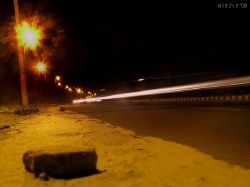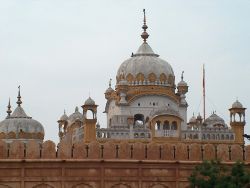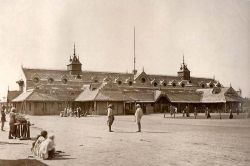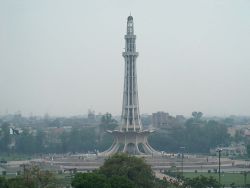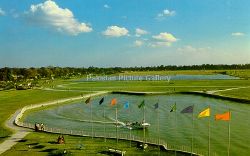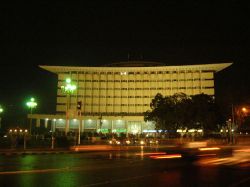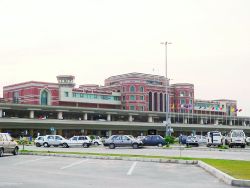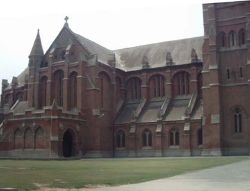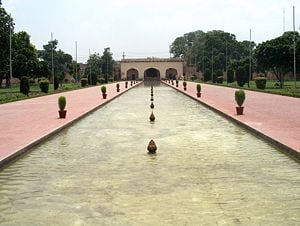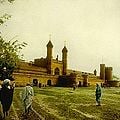Difference between revisions of "Lahore" - New World Encyclopedia
Mike Butler (talk | contribs) |
Mike Butler (talk | contribs) |
||
| Line 123: | Line 123: | ||
The Partition of India resulted in rioting in which one to five million Muslims, Sikhs, Hindus, and others lost their lives, and millions more became refugee migrants to the newly formed Islamic Republic of Pakistan. These riots damaged historic monuments such as the [[Lahore Fort]], [[Badshahi mosque]] and other colonial buildings.<ref>[http://www.travelintelligence.net/wsd/articles/art_48.html Lahore: Blood on the Tracks by William Dalrymple]</ref> | The Partition of India resulted in rioting in which one to five million Muslims, Sikhs, Hindus, and others lost their lives, and millions more became refugee migrants to the newly formed Islamic Republic of Pakistan. These riots damaged historic monuments such as the [[Lahore Fort]], [[Badshahi mosque]] and other colonial buildings.<ref>[http://www.travelintelligence.net/wsd/articles/art_48.html Lahore: Blood on the Tracks by William Dalrymple]</ref> | ||
| − | + | In 1971, economic and political discontent in East Pakistan—geographically separated from West Pakistan—and violent political repression escalated into a civil war in East Pakistan and the Indo-Pakistani War of 1971. The latter resulted in the secession of East Pakistan, which formed the independent state of Bangladesh | |
| − | |||
| − | |||
| − | The | ||
| − | |||
| − | |||
==Government== | ==Government== | ||
Revision as of 19:43, 31 January 2009
| Lahore لاہور |
|||
| — City District — | |||
|
|||
| Coordinates: {{#invoke:Coordinates|coord}}{{#coordinates:31|32|59|N|74|20|37|E|type:city | |||
|---|---|---|---|
| name= }} | |||
| Country | |||
| Province | Punjab | ||
| City District Government | 11th September 2008 | ||
| City Council | lahore | ||
| Towns | 9 | ||
| Government | |||
| - Type | City District | ||
| - City Nazim | Rana Zahid Mahmood | ||
| - Naib Nazim | Rizwan Haider Basra | ||
| - District Coordination Officer | Zubair Akram | ||
| Area [1] | |||
| - Total | 1,772 km² (684 sq mi) | ||
| Elevation | 217 m (712 ft) | ||
| Population (2007)[1] | |||
| - Total | 6,319,000 | ||
| - Density | 3,566/km² (9,238.3/sq mi) | ||
| Combined population of Lahore City and Lahore Cantonment | |||
| Area code(s) | 042 | ||
| Lahore Cantonment is a legally separate military-administered settlement. | |||
| Website: http://www.lahore.gov.pk | |||
Coordinates:
Lahore ▶ (Punjabi: لہور, Urdu: لاہور pronounced [lahor]) is the second largest city in Pakistan after Karachi, and the capital of Punjab province. It is popularly known as the Heart of Pakistan, due to its historical importance in the creation of Pakistan, and also being a cultural, political and educational centre of the country and economic centre of the country's biggest province, Punjab. It is also often called the Garden of the Mughals or the City of Gardens because of the heritage of the Mughal Empire. It is located near the Ravi River and Wagah, close to the Pakistan-India border.
Geography
Lhore is the original name of the city, as lhoris called it. A legend, based on Hindu oral traditions, states that Lahore was named after Lava, son of the Hindu god Rama, who supposedly founded the city. To this day, the Lahore Fort has a vacant temple dedicated to Lava (also pronounced Loh, hence "Loh-awar" or The Fort of Loh).
Lahore lies 811 miles (1305km) northeast of Karachi in the upper Indus plain on the Ravi River, a tributary of the Indus, which flows on the northern side of Lahore. The city is bounded on the north and west by the Sheikhupura District, on the east by Wagah, and on the south by Kasur District. Lahore city covers a total land area of 404 km² and is still growing.
The weather of Lahore is extreme during the months of May, June, and July, when the average temperature 87°F (30°C). In August, the monsoon seasons starts, with heavy rainfall throughout the province. December, January, and February are the coldest months, when temperatures drop to 54°F (12°C. The city’s highest maximum temperature was 48.3°C,[2] recorded on June 6, 1921, and again on June 9, 2007.[3] At the time the meteorological office recorded this official temperature in the shade, it reported a heat index in direct sunlight of 55 °C, lowest temperature recorded is -6.0°C.[2] Average annual precipitation is 24.7 inches (628mm).
The old city area of Lahore has newer commercial, industrial, and residential areas ringed by suburbs on the southeast. Parklands have mostly replaced a wall and a moat that once surrounded the old city. Thirteen gates on a circular road provide access to the old city.
Environmental issues
History
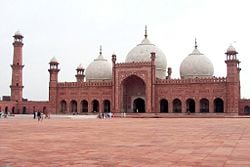
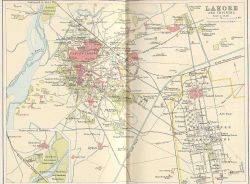
Neolithic populations lived in the region for millennia until settlements, that developed along the Indus Valley, eventually culminated in the Indus Valley Civilization around 3000 B.C.E. A legend, based on Hindu oral traditions, states that Lava, son of the Hindu god Rama, supposedly founded Lahore. Without evidence of when Lahore was founded, some historians trace the history of the city as far as 4000 years. ago.[4].
Ptolemy, the celebrated astronomer and geographer, mentions in his Geographia a city called Labokla[5] situated on the route between the Indus River and Palibothra, or Pataliputra (Patna), in a tract of country called Kasperia (Kashmir), described as extending along the rivers Bidastes or Vitasta (Jhelum), Sandabal or Chandra Bhaga (Chenab), and Adris or Iravati (Ravi).
The oldest authentic document about Lahore was written anonymously in 982 and is called Hudud-i-Alam.[6] Published in Lahore in 1927, this document describes Lahore as a small shahr (city) with "impressive temples, large markets and huge orchards." It refers to "two major markets around which dwellings exist," and it also mentions "the mud walls that enclose these two dwellings to make it one." [7].
Few references to Lahore exist for times before its capture by Sultan Mahmud of Ghazni in the eleventh century. In 1021, Mahmud appointed Malik Ayaz to the throne and made Lahore the capital of the Ghaznavid Empire. The sultan took Lahore after a long siege and battle in which the city was torched and depopulated. As the first Muslim ruler of Lahore, Ayaz rebuilt and repopulated the city. He added city gates and a masonry fort, built in 1037-1040 on the ruins of the previous one, which had been demolished in the fighting. The present Lahore Fort stands in the same location. Under his rule, the city became a cultural and academic center, renowned for poetry. The Ghaznavid dynasty lasted from 1163 to 1186.
After the fall of the Ghaznavid Empire, Lahore was ruled by various Muslim dynasties known as the Delhi Sultanate. When Sultan Qutb-ud-din Aybak was crowned there in 1206, he became the first Muslim sultan of the Indian subcontinent.
A Mongol army sacked Lahore in 1241. In 1398, Lahore fell under the control of the Turkic conqueror Timur.
In 1524, Mughal Babur’s troops captured Lahore, making it part of the Mughal Empire, to remain thus until 1752. From 1584 to 1598, during the rules of the emperors Akbar and Jahangir, the city served as its capital.
Lahore reached a peak of architectural glory during the rule of the Mughals, whose buildings and gardens survived the hazards of time. During this time, the massive Lahore Fort was built. A few buildings within the fort were added by Akbar's son, Mughal emperor Jahangir, who is buried in the city. Jahangir's son, Shah Jahan, was born in Lahore. He, like his father, extended the Lahore Fort and built many other structures in the city, including the Shalimar Gardens. The last of the great Mughals, Aurangzeb, who ruled from 1658 to 1707, built the city's most famous monuments, the Badshahi Masjid and the Alamgiri Gate next to the Lahore Fort.
After the death of Aurangzeb in 1707, Lahore was the location of a power struggle between Mughal rulers and Sikh insurrectionists.
Persian military leader Nādir Shāh (1698–1747) invaded India in 1738, making Lahore an outpost of the Iranian empire.
The city had nine different governors between 1745 and 1756. Bands of warring Sikhs gained control in some areas.
In 1799, all Sikh Misls joined into one to form a sovereign Sikh state, becoming the seat of a government during the rule of Maharaja Ranjit Singh(1799-1839).[8] Singh resisted British incursions for more than 40 years.
After Singh’s death, the city declined, and passed under British rule in 1849, which lasted to 1947. During that time, British construction in Lahore combined Mughal, Gothic and Victorian styles.
The 1929 Congress session was held at Lahore. In this Congress, the Declaration of the Independence of India was moved by Pandit Nehru and passed unanimously at midnight on 31 December 1929.[9] On this occasion, the contemporary tricolour of India (with a chakra at its centre) was hoisted as a national flag.
Noted independence fighter Jatin Das (1904–1929) died in Lahore prison after fasting for 63 days in protest of British treatment of political prisoners. Shaheed Sardar Bhagat Singh (1907–1931), was hanged in Lahore Jail.[10]
The most important session of the All India Muslim League, later the Pakistan Muslim League, the premier party fighting for Indian independence and the creation of Pakistan, was held in Lahore in 1940.[11] Muslims under the leadership of Quaid-e-Azam demanded a separate homeland for Muslims of India in a document known as the Pakistan Resolution or the Lahore Resolution. During this session, Muhammad Ali Jinnah, leader of the league, publicly proposed the Two Nation Theory for the first time.
At independence in 1947, Lahore was made capital of Punjab province in the new state of Pakistan.
The British divided India into three parts: The central part, with a Hindu majority, became modern-day India; the western part along with parts of Punjab became West Pakistan, while East Bengal (the Muslim majority part of Bengal) became East Pakistan.
The Partition of India resulted in rioting in which one to five million Muslims, Sikhs, Hindus, and others lost their lives, and millions more became refugee migrants to the newly formed Islamic Republic of Pakistan. These riots damaged historic monuments such as the Lahore Fort, Badshahi mosque and other colonial buildings.[12]
In 1971, economic and political discontent in East Pakistan—geographically separated from West Pakistan—and violent political repression escalated into a civil war in East Pakistan and the Indo-Pakistani War of 1971. The latter resulted in the secession of East Pakistan, which formed the independent state of Bangladesh
Government
The Islamic Republic of Pakistan is a federal republic in which the president, who is elected by secret ballot through an electoral college comprising the members of the Senate, National Assembly, and the provincial assemblies for a five-year term, is the chief of state, and the prime minister, who is selected by the National Assembly, is head of government.
The bicameral parliament, or Majlis-e-Shoora, consists of the Senate, of 100 members indirectly elected by provincial assemblies and the territories' representatives in the National Assembly, to serve six-year terms, and the National Assembly, of 342 members, 272 of whom are elected by popular vote, 60 seats are reserved for women, and 10 seats reserved for non-Muslims, all to serve five-year terms.
Earlier the Lahore comprised only 6 towns . However in 2001 due to revision of administrative setup it was tagged as City District, further 3 new towns were added. So the total town size rose from 6 to 9 . Under each town there are respective U.C's (Union Councils) and each union council consist of numerous areas. Current U.C size is 150 the list and U.C numbers can be found on (www.lahore.gov.pk).
Administrative towns
- Aziz Bhatti Town
- Ravi Town
- Shalimar Town
- Wagah Town
- Data Ganj Baksh Town
- Gulberg Town
- Allama Iqbal Town
- Samanabad Town
- Nishtar Town
- Lahore Cantt
Localities
- Ichhra
- New Muslim Town
- Hassan Town
- Awan Town
- Mustafa Town
- Johar Town
- Garden Town
- Iqbal Town
- Faisal Town
- Model Town
- WAPDA Town
- Valencia Town
- Township
- Punjab Cooperative Housing Society
- Nespak Society
- Green Town
- Pasco Society
- Muhafiz Town
- NFC Employees Cooperative Housing Society
- Sukh Chayn Gardens
- Bahria Town
- Saroba Garden
Neighbourhoods
- Shad Bagh
- Shadman
- Chah Miran
- Chok yateem khana
- Gawalmandi
- Laxshmi Chowk
- Qila Gujar Singh
- Mozang
- Shahdara Bagh
- Begum kot
- Baghbanpura
- Krishan Nagar
- Defence Housing Authority (Lahore)
- Walled City of Lahore
- Wapda Town
- Sanda
- Mughalpura
- Tajpurra Scheme LDA
- Harbanspura
- Jallo Mor
- Batapur
- Canal View Housing Society
Economy
Overview – Any specialization: For instance, is a manufactured product is associated with particular cities a. Milwaukee—cheese and beer b. Los Angeles—entertainment industry c. Sheffield—coal d. top 20 cities in the U.S. are highly specialized
Per capita GDP, rank Financial and business services sector Tourism Manufacturing Transport: Road, rail, air, sea The city is a hub for Germany’s and Europe’s high-speed passenger rail network. Autobahns radiate from Cologne's ring road. Cologne's international airport is Cologne Bonn Airport, also called Konrad Adenauer Airport. The Rhine harbor is one of the larger inland ports in Germany. Public transport within the city includes buses, a subway system, and the Rheinseilbahn aerial tramway crossing the Rhine. Cologne has pavement-edge cycle lanes linked by cycle priority crossings.
As of 2005, the city's gross domestic product (GDP) by purchasing power parity (PPP) is estimated at $28 billion with an average growth rate of 5.9 percent,[13]ranked 122nd in the world.[14]. Thus the contribution of Lahore to the national economy comes up to 6%.[citation needed] Central to Lahore's economy is the Lahore Stock Exchange (LSE), Pakistan's second largest stock exchange. Lahore has offices of several Pakistani government corporations including the Water and Power Development Authority (WAPDA) and Water and Sewage Authority (WASA). Food and restaurant businesses remain open all night. The shopping markets are usually open late into the night.[citation needed] Lahore is the second largest financial hub of Pakistan and has industrial areas including Kot Lakhpat and the new Sundar Industrial Estate (near Raiwand).
Lahore's economic strength relies on the fact that it is the biggest city of the most populous province Pakistan. It is also the most advanced in terms of infrastructure, having extensive and relatively well developed road links to all major cities in Punjab and NWFP, rail link with India and the provinces biggest International airport. It also has the most developed communcations infrastructure in the province, which includes a wide network of fiber optic telephone and cable lines, GSM mobile network, IPP and WiMax. It has the most developed education and health sectors as well, making it the economic, political and educational hub of the province.
As Lahore expands, former residential areas are being turned into commercial centres, and the suburban population is constantly moving outwards. This has resulted in the development of the Liberty Market, MM Alam Road, the new Jail Road (which has some of the largest office buildings in Lahore), and the Main Boulevard[citation needed]
The suburban population's move from commercial areas to less busy areas supports a thriving construction industry and several large housing projects including Bahria Town, Lake City, Sukh Chayn Gardens, Eden Villas, and a project by the Dhabi Group (a joint Pakistan-UAE partnership) to construct a new city on the outskirts of Lahore.[citation needed]
Lahore is famous as the hub of hand-made carpet manufacturing in Pakistan.[15] At present, hand-knitted carpets produced in and around Lahore are among Pakistan's leading export products, and their manufacturing is the second-largest cottage and small industry. Lahore-based carpet exports make up nearly 85 percent of all carpet exports from Pakistan.[citation needed] Craftsmen in Lahore produce almost every type of hand made carpet using popular motifs such as medallions, paisleys, traceries, and geometric designs. The Lahore Design Centre at the Punjab Small Industries Corporation maintains a separate section of carpet designing to experiment with new designs. Lahore is famous for single-wefted designs in Turkoman and Caucasian style and double-wefted Mughal types.
Lahore's economic importance depends on many government institutes and international companies headquartered in the city, including WorldCALL Telecom Group, Pakistan Railways, Pakistan Cricket Board, Punjab University, NCA, Bata shoes, Haier, Wateen Telecom, Warid Telecom, Honda, Reebok, Daewoo, Nestle, Audi, Coca Cola, Tetra Pak, Monsanto, Delaval, Metro Cash & Carry, Mr Cod, Porsche and Rolls Royce.[citation needed]. The fact these companies have settled major operations and accounted for almost half of the Foreign Direct Investment coming into Pakistan has proven Lahore's relatively calm social environment, infrastructure and sophisticated consumer market.
Projects
Expo centre Lahore is underconstruction such as long delayed Lahore expo centre, the Mubarak complex, consisting of four towers and a small eclipse shaped building, houing uniquely designed apartments along with a five story covered shopping mall, which will be biggest and most exclusive shopping and entertainment complex in the region.The project is being carried out as a joint venture between the Abu Dhabi Group and the Government of Punjab. The two investors have formed a holding company for Zayed Centre called Taavun (Pvt.) Ltd. which will be responsible for managing the project. Turner Construction, one of the largest construction companies in the US, have been hired as contractors/builders. Hellmuth, Obata and Kassabaum have been retained as project consultants & architects. The residential apartments will be managed by Concord. The exact cost of the project is unknown as of yet but is estimated at $500 Million US.
Lake City is a resort and residential development planned on the outskirts of Lahore. Covering an area of more than 2104 acres, the resort with its lush green parks, sinuous lakes, an 18 hole regulation Golf course and other features.
Defence Raya Golf Resort is Pakistan's largest as well as Asia's largest golf course is under construction. Defence Raya Golf Resort is the result of a partnership between DHA Lahore and BRDB Malaysia.The rapid development of mega projects in city will boost up the economy of country.
Many other projects under construction in lahore are Pace tower(under construction), mall99(approved), expo centre lahore, expo centre tower(under construction), mubarak complex(under construction), IT tower(under construction), Alamgir tower(approved),DHA Halley tower(under construction), Lahore ring road(under construction), sports city(under construction), Kot lakhpat elevated expressway(approved), mass transit system(under construction),xinhua mall (under construction), lahore-sialkot motorway (under construction), boulevard heights(under construction), Pearl continental tower (proposed), LDA tower(approved),bank square gulberg (vision), pace circle (under construction), tricon corporate tower (under construction), The economy is also enhanced by Lahore's historic and cultural importance, even though, unlike other smaller cities, its industrial estates are far fewer and smaller. Being the capital of the largest province in Pakistan brings the city the biggest development budget in the country.
Transportation
Lahore is one of the most accessible cities of Pakistan. In addition to the historic Grand Trunk Road (G.T. road), a motorway was completed in 1997 from Lahore to Islamabad. The government has built underpasses to ease congestion and prevent traffic jams, and according to official figures, Lahore has the highest number of underpasses in Pakistan. The government would undertake planned rehabilitation of the roads, which have outlived their designed life, construction of missing road links and development of provincewide secondary arteries linking national motorways and trade corridors to foster economic opportunities via meeting expanding domestic and international travel and trade demands.
The Punjab government had allocated Rs 170.300 million for W/I of Thokar- Raiwind Road, Rs 50 million for dualisation of Lahore-Jaranwala Road from Ferozepur Interchange to Mandi Faizabad, Rs 40 million for construction of extending building for IWMI Thokar Niaz Baig Lahore, Rs 2.7 million for construction of overhead bridge at Sheikh Abdul Qadir Jillani Road near University of Animal and Veterinary Sciences, Rs 56 million for PC-II for feasibility study of elevated expressways in Lahore, Rs 10 million for construction of elevated expressway from Lahore Bridge to Niazi Chowk, Rs 50 million for strengthening of Sheikhupura-Gujranwala Road,and Rs 15 million for construction of missing by-pass between Sargodha to Lahore Road.
The Pakistan Railways headquarters is located in Lahore [citation needed]. Pakistan Railways provides an important mode of transportation for commuters and connects distant parts of the country with Lahore for business, sight-seeing, pilgrimage, and education. The Lahore Central Railway Station, built during the British colonial era, is located in the heart of the city.
To accommodate increased air travel, the government built a new city airport in 2003.It was named Allama Iqbal International Airport after the national poet of Pakistan, Allama Muhammad Iqbal, and is served by international airlines as well as the national flag carrier, Pakistan International Airlines. The previous airport now operates as the Hajj Terminal to facilitate the great influx of pilgrims traveling to Saudi Arabia to perform the hajj every year. Lahore also has a general aviation airport known as Walton Airport.
Lahore Rapid Mass Transit (LRMT) System is a project envisioned to provide mass transit facilities to Pakistan's second largest city Lahore. The project is expected to complete in 2020. In the first phase, two light rail lines will be constructed. The first Green Line between Shahdra and Hamza Town (Ferozpur Road) will be completed by 2011 and cost 2.4 billion dollars. The second Orange Line between Pakistan Mint and Sabzazar will cost US $1.9 billion and will be completed by 2015. In the second phase, Blue and Purple lines will be constructed.
Despite these improvements, Lahore struggles for safety on its roads, which are dangerous because the number of vehicles overwhelms the road space. Massive congestion occurs every day as millions of Lahoris travel through disorganised, fast-moving traffic, and accidents are rife.[citation needed] The government is trying to improve traffic conditions by constructing overhead bridges, underpasses, and conducting public safety campaigns. Plans exist for a high-speed railway between Lahore and Rawalpindi.
See also: Lahore ring road project
Demography
According to the 1998 census, Lahore's population was nearly 7 million. Mid-2006 government estimates now put the population at approximately 10 million.[16] This makes Lahore the second largest city in Pakistan, fifth largest city in South Asia and the 23rd largest city in the world.
Race/ethnicity - historical background of ethnic groups
Punjabi and Urdu are the native languages of the province and is the most widely-spoken language in Lahore and rural areas. Urdu and English, however, are becoming more popular with younger generations since they are officially supported, whereas Punjabi has no official patronage. Many people of Lahore who speak Punjabi are known as Lahori Punjabi due to their use of a mixture of Punjabi and colloquial Urdu.
Religion
Colleges and universities
According to the 1998 census, Lahore's population was nearly 6.8 million,. Mid-2006 government estimates put the population at somewhere around 10 million, which makes it the second largest city in Pakistan, after Karachi.[17] It is considered to be one of the 30 largest cities of the world. Also according to the 1998 census, 86.2%, or 6,896,000 of the population are Punjabis and 10.2% or 816,000 are Urdu speaker. Finally, 3% Pashto and the Seraikis at 0.4% number about 32,000.[18] Figures are unavailable for the many Afghan refugees and migrants from Iran who have permanently settled in Lahore but were not included in the census.
The main languages spoken in Lahore are Urdu and Punjabi. According to the 1998 census, 93.9% of Lahore's population is Muslim, up from 50.1% in 1941. Other religions include Christians 5.80% (higher in rural areas where they form around 9.0% of the rural population as well as Ahmadis at 0.20% and a small number of Bahá'ís, Hindus, Parsis, and Sikhs.[citation needed] In 1941, Lahore had 36.3% Hindus and 18.4% Sikhs. Due to Lahore diverse culture, there are many mosques, shrines, Hindu and Jain temples, gurdwaras, and churches across the city. Some of the most famous mosques include, Badshahi Masjid, Dai Anga Mosque, Data Durbar Complex, Shia Masjid, Suneri Mosque, Wazir Khan Mosque, Moti Masjid, Masjid-e-Shuhda (Martyr's Mosque) and Mosque of Mariyam Zamani Begum. Some of the famous shrines include, Tomb of Muhammad Iqbal, Bibi Pak Daman, Samadhi of Ranjit Singh, Tomb of Shah Jamal, Tomb of Lal Hussain, Tomb of Anārkalī, Tomb of Jahangir, Tomb of Empress Nur Jehan and Tomb of Abdul Hasan Asaf Khan. Some of the well-known churches include, Regal Church, Hall Road Church, Convent of Jesus & Mary and Saint Anthony's Church.
Education
Lahore is known as the education capital of Pakistan, with more colleges and universities than any other city in the country. A true Science & Technology hub of Pakistan. Pakistan’s largest producer of quality professionals in the field of Science & Technology as well as in High Tech such as IT, Engineering, Medical, Nuclear Sciences, Pharmaceutical, Telecommunication, Bio- Technology and Microelectronics etc.[19] Most of the reputable universities are public, but in recent years there has also been an upsurge in the number of private universities.[citation needed] LUMS, the Lahore University of Management Sciences, is the most renowned business school in Pakistan.National University Of Computer and Emerging Sciences previously known as [Foundation of Advancement of Science and Technology] FAST-ICS has been in Lahore for a long time and producing quality graduates in Computer Science. Recently, they also introduced programs in Management, Telecommunication and Computer Engineering.
. Lahore School of Economics is another famous business school in the city. University of Management and Technology (Pakistan) is also located in lahore which is one of the best business universities in Pakistan. Cathedral School Lahore is one of the oldest and most famous schools in Lahore it is present there since 1850's and has a great ranked faculity and administration staff. The University of the Punjab is the oldest institute of higher learning in the country. [20] Within it the Institute of Administrative Sciences traces its roots to 1962. NCA, the National College of Arts, is the oldest and most renowned arts college of Pakistan.[citation needed] The oldest institution of Pakistan, Government College Lahore (now Government College University), established in 1864, is also situated in Lahore. Forman Christian college(F.C)is also one of the oldest educational institute of Lahore.it was established in 1864.Now it becomes a Chartered University.
UCP, Lahore is the one of the best education Institute in Pakistan.[21] UET, Lahore is the one of the most highly regarded engineering universities in Pakistan.[22] COMSATS is also a well-known institute recently awarded the university charter.[23] Lahore Chitrkar is the only private institute which offers classes in painting, various music instruments and Kathak dance.[24] it is committed to help make Lahore the most livable mega city of the South Asian Region by 2010 and one of the thirty leading educational cultural, commercial, industrial and information technology centers of the world by 2020.
Culture
- The tomb of Malik Ayaz can still be seen in the Rang Mahal commercial area of town.
Lahore's culture is unique. Known as the cultural capital or Heart of Pakistan, the city has been the seat of the Mughal Empire and the Sikh Empire as well as the capital of Punjab in Mahmud Ghaznavi's 11th century empire and in the British Empire.
Much of Lahore's architecture from the Mughal and colonial eras has been preserved. Mughal structures such as the Badshahi Mosque, Ali Hujwiri, Lahore Fort, Shalimar Gardens and the mausoleums of Jehangir, and Nur Jehan are popular tourist spots in the city. Colonial British structures such as the Lahore High Court, General Post Office (GPO) and many of the older universities still retain their Mughal-Gothic style.
Lahore played an important role in Pakistani history, as it was in this city where the independence declaration for Pakistan was made. The city was the only known major city of the British Empire that would come into the new Muslims state.[citation needed] It was the largest city in the newly formed Pakistan at the time of independence and provided the easiest access to India, with its porous border near the Indian city of Amritsar only 30 miles (48 km) to the east. Large numbers of Hindus, Sikhs, and Muslims lived closely in Lahore in the pre-Partition era, and the city suffered many revolts, demonstrations and bloodshed at the time of independence due to the enmity between Muslims and Hindus at the time and the uncertainty which loomed over the fate of Lahore even after India and Pakistan gained independece.[citation needed]. Lahore's culture, its history, institutions, food, clothing, films, music, fashion, and liberal community lifestyle attract people from all over the country.
Lahore is an extremely festive city. This city is the most happening city of Pakistan. The people of Lahore celebrate many festivals and events throughout the year, blending Mughal, Western, and current trends. Eid ul-Fitr and Eid ul-Adha are celebrated. Many people decorate their houses and light candles to illuminate the streets and houses; roads and businesses are lit for days during these public holidays. In Lahore is located the mausoleum of Ali Hujwiri also known as also known as Data Ganj Bakhsh (Persian/Urdu: داتا گنج بخش) or Data Sahib and an annual Urs is held every year as a big festival.
Basant is a Hindu festival marking the coming of spring. Basant celebrations in Pakistan are centered in Lahore, and people from all over the country as well as abroad come to the city for the annual festivities. Kite-flying competitions traditionally take place on city rooftops during Basant. Courts have banned the kite-flying because of casualties and power installation losses. The ban was lifted for two days in 2007, then immediately reimposed when 11 people were killed by celebratory gunfire, sharpened kite-strings, electrocution, and falls related to the competition.[25]
The Festival of Lamps, or Mela Chiraghan, is an important and popular event in Lahore. This is celebrated at the same time as Basant, every spring on the last Friday of March, outside the Shalimar Gardens.
The National Horse and Cattle Show is one of the most famous annual festivals, held in spring in the Fortress Stadium. The week-long activities include a livestock display, horse and camel dances, tent pegging, colourful folk dances from all regions of Pakistan, mass-band displays, and tattoo shows in the evenings.
On August 14, the people of Pakistan celebrate the day Pakistan gained its independence from the British Raj. There are lots of celebrations in Lahore, the streets are full of people singing and dancing. Parades of the Pakistan Army and Pakistan Air Force are held early in the morning. Concerts are held with many pop and classical singers.
The World Performing Arts Festival is held every autumn (usually in November) at the Alhambra cultural complex, a large venue consisting of several theatres and amphitheatres. This ten-day festival consists of musicals, theatre, concerts, dance, solo, mime, and puppetry shows. The festival has an international character with nearly 80 percent of the shows performed by international performers. On average 15-20 different shows are performed every day of the festival.[26]
Lahoris are known for their love of food and eating. While Lahore has a great many traditional and modern restaurants, in recent years Western fast food chains, such as McDonald's, Pizza Hut, Subway Sandwiches, Dunkin Donuts, Nando's and Kentucky Fried Chicken have appeared all over the city. Recently the food streets in the historic locales of Lahore (Gawalmandi, Anarkali, and Badshahi) have attracted tourists. Food streets have undergone restorations and are cordoned off in the evenings for pedestrian traffic only; numerous cafés serve local delicacies under the lights and balconies of restored havelis (traditional residential dwellings). Some of the trendiest restaurants in Lahore are concentrated on the M M Alam Road in Gulberg. Here, dozens of high-class culinary outlets, ranging from Western franchises to traditional, ethnic, or theme restaurants, attract all classes of Lahore's citizens. New restaurants are constantly opening, and the business is extremely competitive. Many boisterous restaurants of Lahore are open late into the night. One of Lahore's unique café restaurants is "Coocoo's Den", located in the old city just behind the Badshahi Mosque and Lahore Fort at the edge of Lahore's red light district.[citation needed] The restaurant is housed in a 300-year-old Kothi-style dwelling of a famous artist and was once a brothel. At different times in the life of this property, Hindu, Buddhist, Christian, and Muslim families have owned it. Another famous Lahore landmark is the Pak Tea House in Anarkali, long a favoured haunt of intellectuals and artists.
For traditional shopping, the Anarkali and Ichhra bazaars are the most popular of many in the city.[citation needed] The alleys and lanes of these bazaars are full of traditional wares like leather articles, embroidered garments, glass bangles, beaten gold and silver jewelry, and creations in silk. Anarkali is named after the famous courtesan of Akbar’s time, Anarkali (Pomegranate Blossom). The grave of Sultan Qutbuddin Aibak, who died falling off his horse while playing polo, is located in Anarkali on Aibak Road. Mahmud Ghaznavi's general, Malik Ayaz, lies buried in the commercial area of Rang Mahal.[citation needed]. Rang Mahal is part of old Lahore and today's houses a largest wholesale and retail cloth markets in Punjab. Lahore's technology markets include the Hall Road Pakistan's largest Electronics market adjacent to the Mall Road and the Hafeez Centre Asia's largest Computer Market located on the Gulberg Main Boulevard. Pace, a shopping centre, is also located on the Main Boulevard beside the Hafeez Centre. Other well-known and popular shopping areas are the Liberty Market in Gulberg and at the Fortress Stadium, as well as malls in Gulberg, Model Town, MM Alam Road, and Cantonment. Apart from these, shopping areas are being developed in many of Lahore's new suburbs such as Bahria, Lake City, and Cantonment.lahore is famous for its renowned people such as raza khan who is currently in LLC
Lahore is known as the City of Gardens. There were many gardens in Lahore during the Mughal era, and although some have since been destroyed, many have still survived. The Shalimar Gardens were laid out during the reign of Shah Jahan and were designed to mimic the Islamic paradise of the afterlife described in the Quran. The gardens follow the familiar charbagh model (four squares) with three descending terraces. The Lawrence Gardens were established in 1862 and were originally named after Sir John Lawrence, late 19th century British Viceroy to India. The gardens were organized in an area covering 112 acres (0.5 km²).[citation needed] The British East India Company vowed that it would provide for the garden 80,000 saplings of 600 different species from every corner of the world. After money was collected from the sale of Badami Bagh, the soldiers' bazaar at Anarkali, and from a grant by the Company Bahadur (an extension of the East India Company), the land was purchased in the year 1860. Today it is known as Bagh-e-Jinnah.[citation needed] The many other gardens and parks in the city include Hazuri Bagh, Iqbal Park, Mochi Bagh, Gulshan Iqbal Park, Model Town Park, Race Course Park, Nasir Bagh Lahore, Jallo Park, Wild Life Park, and Changa Manga, an artificial forest near Lahore in the Kasur district.
Lahore offers a variety of activities for night-time enjoyment. There are popular shisha bars (these places offer flavoured tobacco pipes commonly found in middle eastern nations), attractive food outlets and musical concerts and shows. Alcohol is available to foreigners who request it at certain hotels, but generally not sold in public.
Lahoris are known for their exquisite taste in food, so the market has produced some of the most versatile, classy and inviting restaurants in the world. The blend of food and music at some uniquely expressive locales is truly exceptional. There are many shopping areas which remain open late into the night offering an atmosphere of lively hustle and bustle (not to mention a bargain at every corner).
There are scenic parks built with a goal to promote relaxation and enjoyment of nature which are frequently visited by joggers, couples, children, students and seniors. Bagh-e-Jinah (also known as Laurence Garden) is one such place; it has a large variety of gorgeous plants, trees, long and varied pathways and creative light effects.
Younger crowd is generally more attracted to shops and restaurants near Qaddafi stadium, Fortress stadium and Gulberg.
Media
Lahore is the core of Pakistan's media and Arts scene. Pakistan's most prestigious Art college National College of Arts is located here. Every year it becomes the center for 'World performing Arts festival' in which artists from dozens of countries show off their talents'. This festival is managed by the Peerzada group, which is also the largest puppetry theater company in the Pakistan. Lahore is also home to the country's developing fashion industry supported by numerous designer outlets and the country's most prestigious Fashion school, the Pakistan school of Fashion and Design which has some of the best photo studios and photographers in the country.
Lahore has also been home to Pakistan's old classical music, ghazals and Qawalis, with big names such as Noor jehan, arif lohar, Nusrat Fateh Ali Khan, Mehdi hassan, Ghulam Ali etc all residing in the city. In recent years Lahore has given out Pakistan's largest pop singer such as Atif Aslam and Ali Zafar, while the city is recognized as the birthplace of modern rock scene in south Asia by bands such as Jal, Call the band, Roxen, Noori and Entityparadigm, which were hugely popular and lead many in the Indian film industry to import their songs.
Pakistan's film industry is also based in the city and is called Lollywood. Many films are filmed in Lahore and the city has some of the oldest film studios in the country. Many actors and directors are based in Lahore which brings many artists together to launch films. Cinema is on the incline again in recent years and IMAX is also building outlets in the city.
Several FM radio stations have set up their operations here and some of the TV channels are also working from this city. Adding to this media boom, City News Network (Pvt.) Ltd. is brining Pakistan's first City-specific satellite TV channel. They are launching a City Channel of Lahore with the name City42. City42 will be a satellite channel beaming its broadcast to entire Pakistan, Asia, Middle East and some European countries. City42 will be a NEWS and INFOTAINMENT-based channel covering everything that happens in the city of Lahore.
Lahore is also home to Geo TV's Infotainment Division and the headquarters of Pakistan's first Kids television channel Wikid and the first community Channel of Pakistan for [DHA].
Sports
Gaddafi Stadium is a Test cricket ground in Lahore. Designed by Pakistani architect Nayyar Ali Dada, it was completed in 1959 and is one of the biggest cricket stadiums in Asia. After its renovation for the 1996 Cricket World Cup, the stadium had a capacity of over 60,000 spectators for high-profile matches or events. Nearby is an athletics stadium, a basketball pitch, the Al Hamra, open-air hall similar in design to the coliseum, and the world's largest field hockey stadium, Another Cricket Ground and HEadquarters of Pakistan Cricket Board, all based in the city's Sports complex. In the same vicinity lie headquarters of the Pakistan Football Federation, as well as the multi-sport Punjab Stadium.
Lahore is home to Pakistan Premier League giants WAPDA FC, alongside Pakistan Railways FC, PEL FC, and Wohaib FC.
The Lahore Marathon is part of an annual package of six international marathons being sponsored by Standard Chartered Bank across Asia, Africa, and the Middle East. The Lahore race carries prize money of approximately US$100,000. More than 20,000 athletes from Pakistan and all over the world participate in this event. It was first held on January 30, 2005, and again on January 29, 2006. More than 22,000 people participated in the 2006 race. The third marathon was held on January 14, 2007.[27].
Plans exist to build Pakistan's first sports city in Lahore, on the bank of the river Ravi.
Gallery
- Lahore railway station1880s.JPG
George Craddock, 1880s, Railway Station at Lahore, Pakistan.
- Street scene of Lahore, 1890s.jpg
Street scene of Lahore, 1890s.
- Government College, Lahore 1880s.jpg
Government College of Lahore, 1880s.
- Zam Zammeh 1921.JPG
Photograph of the cannon Zam Zammeh outside Lahore Museum which was immortalized in Rudyard Kipling's novel Kim
irfan lahore
Literature
- Muhammad Iqbal, scholar, thinker, and poet in Urdu and Persian.
- Faiz Ahmed Faiz, poet in Urdu
- Bapsi Sidhwa, novelist in English, author of Cracking India and The Crow Eaters
- Allama Ghulam Ahmad Pervaiz, scholar and thinker in Urdu and English. His institute is running in Lahore in the name of Tolu-e-Islam. Web address is http://www.tolueislam.com/.
- Muhammad Tahir ul-Qadri, Islamic hadith compiler, poet and author.
- Saadat Hasan Manto, short story writer in Urdu
- Rudyard Kipling, novelist in English, author of Kim (born in Bombay)
- Mohsin Hamid, novelist in English, author of Moth Smoke and The Reluctant Fundamentalist
- Shauna Singh Baldwin, novelist, author of What the Body Remembers
- Pran Nevile, author of Lahore - A Sentimental Journey
- Munshi Muhammad Khalilur Rehman, prolific writer and translator in Urdu, "Azra", "azra ki Wapsi", set the tradition for a new style of writing Muslim history, father of 4 famous professors — Professor Muhammad Jamilur Rehman of the Usmania University, Professor Muhammad Naeemur Rehman of the Allahabad University, Professor Bazlur Rehman of the Bombay University and Professor Waliur Rehman of the Usmani University.
- Prof. Dr. Shahbaz Malik,- Pride of Performance - (Pioneer of Punjabi Language & Literature).
See also
| ||||||||||||||||||||||||||
ReferencesISBN links support NWE through referral fees
- ↑ 1.0 1.1 Punjab Portal. Government of Punjab. Retrieved 2007-12-11.
- ↑ 2.0 2.1 QUETTA
- ↑ "Heatwave to persist for 4-5 days", The Dawn, June 10, 2007.
- ↑ https://www.glasgow.gov.uk/en/News/Archives/2006/September/GlasgowLahoreTwinning.htm
- ↑ Imperial Gazetteer of India, v. 16, p. 106
- ↑ HUDUD AL-'ALAM 'The Regions of the World' A Persian Geography
- ↑ Dawn Pakistan - The 'shroud' over Lahore's antiquity
- ↑ Encyclopædia Britannica article on Lahore
- ↑ Tribune India - Republic Day
- ↑ Daily Times Pakistan - Memorial will be built to Bhagat Singh, says governor
- ↑ Story of Pakistan - Lahore Resolution 1940, Jin Technologies. Retrieved on September 19, 2007.
- ↑ Lahore: Blood on the Tracks by William Dalrymple
- ↑ http://www.pwc.com/uk/eng/ins-sol/publ/ukoutlook/pwc_ukeo-mar07.pdf
- ↑ List of countries by GDP (PPP)
- ↑ "A Brief Introduction to Carpet Weaving History of Pakistan". Al Rug. Retrieved 2007-07-01.
- ↑ Official Profile: Lahore's geography, Lahore City Government. Retrieved on September 19, 2007.
- ↑ Demography of Lahore, Lahore City Government. Retrieved on September 19, 2007.
- ↑ FindPK - Lahore
- ↑ Raza, M. Hanif (1999). Portrait of Pakistan. Lahore, Punjab, Pakistan: Ferozsons, Ltd., 155. ISBN 9690015451.
- ↑ "University of the Punjab - Introduction". University of the Punjab. Retrieved 2007-06-06.
- ↑ "University of Central Punjab". University of Central Punjab". Retrieved 2007-06-06.
- ↑ "University of Engineering and Technology". university of engineering and Technology". Retrieved 2007-06-06.
- ↑ "COMSATS university". comsats University. Retrieved 2007-06-06.
- ↑ {{cite web SLS | title = "Lahore Chitrkar" | publisher = Lahore Chitrkar | url = http://lahorechitrkar.com/view-page.php?page=home | accessdate = 2007-12-12}}
- ↑ 11 Dead At Pakistani Kite Festival, Metal Kite Strings, Stray Celebratory Gunfire Claim Lives At Annual Event, More Than 100 Injured. CBS News (2007-02-26). Retrieved 2007-08-02.
- ↑ World Performing Arts Festival
- ↑ Lahore Marathon Website
External links
- World Fact Book 2009 Pakistan Retrieved January 31, 2009.
- Encyclopaedia Britannica Lahore Retrieved January 31, 2009.
- Lahore City Government
- Lahore Photos and History
- Travel guide to Lahore from Wikitravel
- Wikia has a wiki about this topic: Lahore
- Lahore Classifieds
- {{{2}}} at the Open Directory Project
- Lahore's Cultural Events, Sports and Tourist Guide
- World Heritage Photographs of the Lahore Fort and Shalimar Gardens
- Lahore in Photographs
- Simon Jenkins (2008-01-11). Here in the city of Kim, Pakistan's magnificent history is being left to rot. The Guardian. Retrieved 2008-02-09.
Credits
New World Encyclopedia writers and editors rewrote and completed the Wikipedia article in accordance with New World Encyclopedia standards. This article abides by terms of the Creative Commons CC-by-sa 3.0 License (CC-by-sa), which may be used and disseminated with proper attribution. Credit is due under the terms of this license that can reference both the New World Encyclopedia contributors and the selfless volunteer contributors of the Wikimedia Foundation. To cite this article click here for a list of acceptable citing formats.The history of earlier contributions by wikipedians is accessible to researchers here:
The history of this article since it was imported to New World Encyclopedia:
Note: Some restrictions may apply to use of individual images which are separately licensed.

